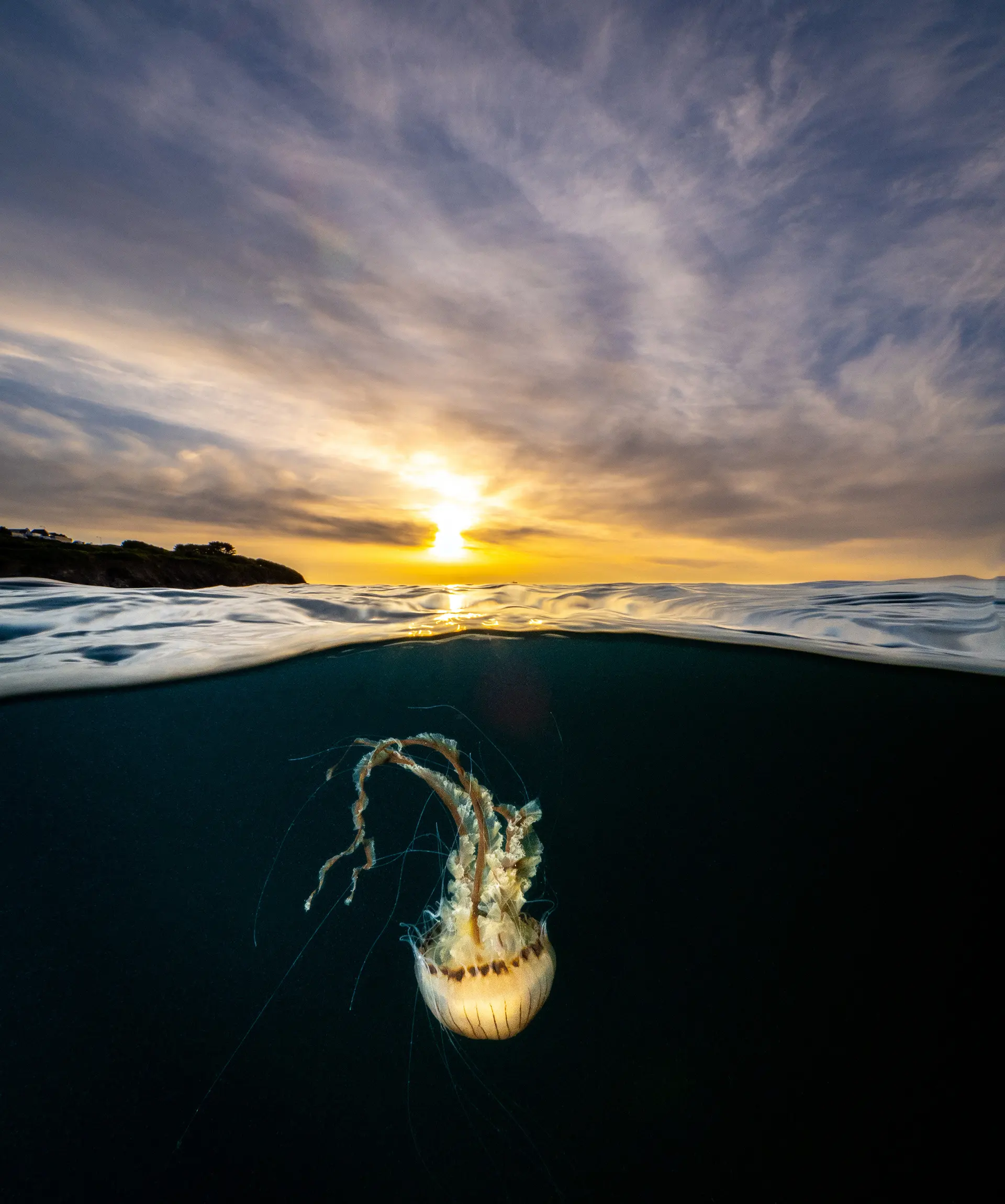What Lies Beneath

A jellyfish of the coast of Cornwall. Photograph: Martin Stevens.
Watching a recent television episode of a father and son fishing from a boat reminded me of how much of our youth was spent on the water. When I say water, I mean the open water, and when I say open water, I mean the water above The Grand Banks. Occasionally I recall not being able to see the shore through a fog bank or mist and a great dread would swell up from inside my stomach and stick in my throat. It wasn't sea sickness, it was fear. Being able to see the shore was a safety blanket. I remember a few times when the swell of the sea was such that you would regularly lose sight of land and you’d find yourself confounded by the perception that you were looking up at a hill of water. Then, in the next moment, you were looking down a slope of it as though you were a surfer riding a wave. All of this would take place in a 16-foot wooden boat (was it even 16 feet?) that on land seemed stubbornly hard to move but on the water felt as though it were simply a fallen leaf from a willow.
This fear has a name – thalassophobia. From a definition found online, its veracity confirmed by its ubiquity:
“The thalassophobia (from the Greek, Thalassa or “sea”) definition is pretty straightforward — it's defined as the persistent fear of vast, deep, and often dark bodies of water that feel dangerous. Specifically, thalassophobia describes a person's fear of the great unknown in the water right below their feet.”In a funny way, having spent enough time on the sea made other bodies of water like lakes, ponds or rivers seem puny and harmless by comparison. Only wild, rapidly moving rivers seemed ominous and something to be feared. To me, fresh water was almost quaint. What could possibly be in there? A fish? Some weeds? Nothing nearly as frightening as a mammal the size of a city bus or a flock of formless jelly fish and their stringy unpredictable stingers. That is until I spent some time on Lake Ontario in a Kayak.
Sitting in a kayak, you are actually just below the water line. A larger sea kayak, 16 feet or so, is much more stable than say some racing shell or something and it still feels like you could capsize at any moment. When I first tried kayaking, I thought my shoulders would have been strained, but it was really my lower back and core that ached at night, from always correcting and trying to maintain balance. It wasn't until I was more confident, assured the craft generally will bob over water, when I could relax and not be in some constant high wire balancing act. I have mostly kayaked on lazy rivers like parts of The Ottawa River, The Humber or in and around the Toronto Islands, but crossing the inner Toronto Harbour on a windy and busy day can be surprisingly adventurous. Even without any wind, you can feel the depth below you, like a heaviness dragging under the hull. One morning as I was negotiating crests and the wake from ferries, I saw a large white object in the water. For whatever reason I paddled toward it, all the way thinking, "not a body, not a body, not a body… don't be a body". As I got closer I thought it was some plastic pool toy or float but when I got close enough I could see it was a dead fish. A big dead fish. A pike if I'm correct. Suddenly, seeing that thing, I realized, this lake has a lot more in common with the ocean. Here be monsters.

'Pike: a fish so called from its long slender shape and pointed snout."
Maybe it was because I had seen that large silvern corpse I became more aware of where exactly I was paddling. As I reconnoitered the harbour I came to what is known as the Eastern Gap, an area that once connected Toronto Islands to the mainland until being washed out by a storm decades ago. It was left as a convenient passage for boats to enter the harbour and access the lakeshore. I thought briefly about continuing through it out to the lake (not allowed by the rental agreement) but thought better of it and turned my attention to a busy area now under major construction, called the Portlands. Work is being done to re-naturalize The Don River and create an area for major development in years to come. I noticed a boat with fishing lines in the water and decided to steer clear of them. I also wondered exactly what you would catch in this post-industrial waterway. I was more interested in a colony of cormorants and paddled in their direction. That's when something about a foot and a half long breached the water and launched itself over my bow. I was startled. Very startled. My heart raced. I momentarily thought I'd maybe soiled the kayak and would have to make an offer to purchase the rental. When I calmed down a bit, I could see this fish, most likely a bass, swim around then under the kayak before going too deep to see. Then I started laughing, partly at the joy of the encounter, but also at the absurdity of my shock. I can't even imagine what my reaction would have been if a killer whale had breached nearby or a seal had thrown an octopus at me (it could happen)? More than anything, it reminded me of my discomfort as a boy, looking over the gunnel of our boat, down into the deep, dark, light-absorbing unknown with a slight touch of thalassophobia.


0 Comments:
Post a Comment
<< Home